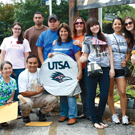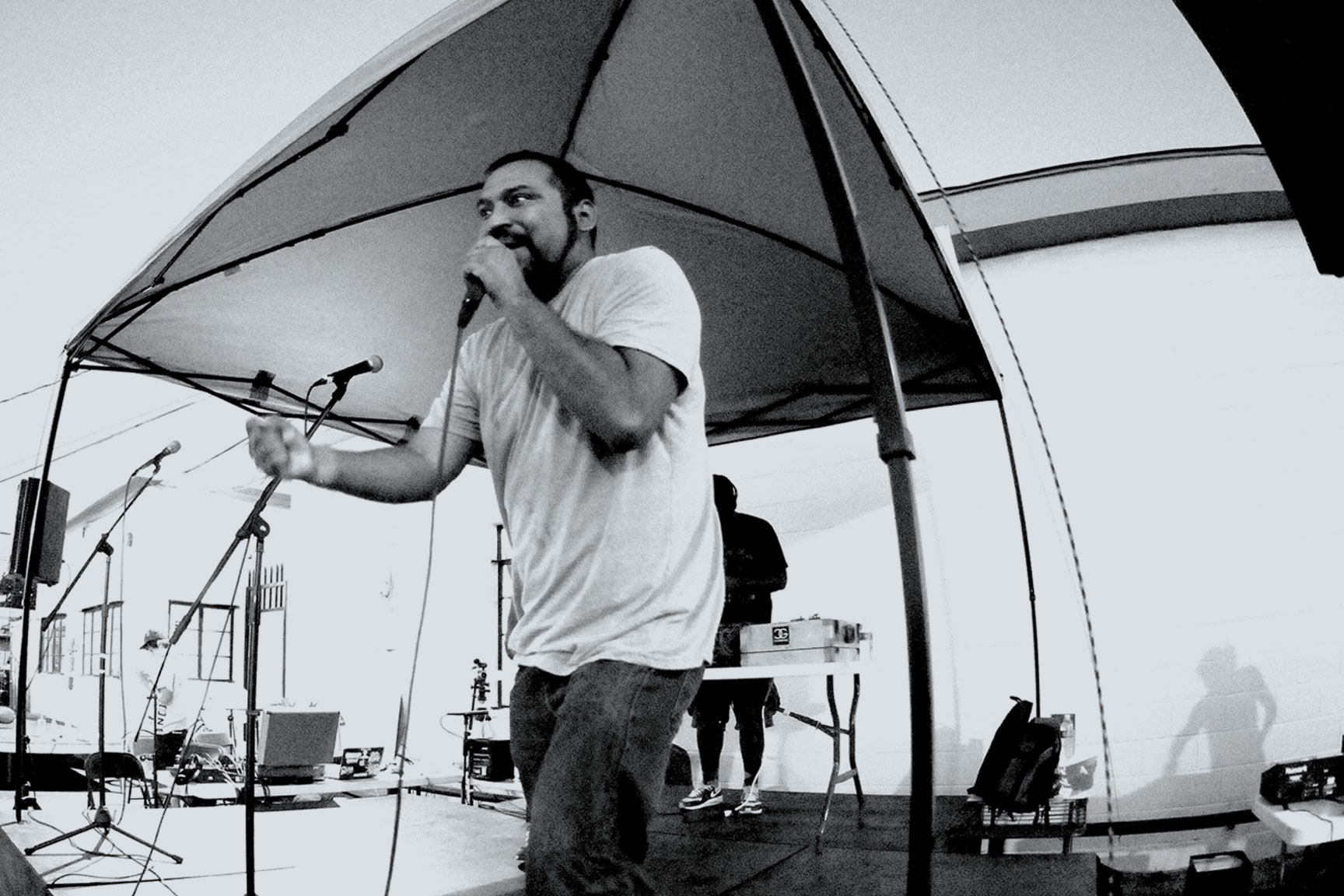News Briefs
UTSA among national leaders in degrees awarded to Hispanics
The University of Texas at San Antonio is No. 5 in the nation in the number of undergraduate degrees awarded to Hispanic students, according to the May 2012 edition of The Hispanic Outlook in Higher Education. Additionally, UTSA was ranked No. 12 nationally in the number of master’s degrees awarded to Hispanics.
The magazine editors surveyed the Top 100 predominantly Hispanic-serving colleges and universities in the United States and Puerto Rico. Results were released for the 2011 academic year.
UTSA earned its No. 5 ranking for awarding undergraduate degrees to 1,883 Hispanic students of 4,138, representing 46 percent of the graduating class. UTSA also earned a No. 12 ranking for master’s degrees, awarding master’s to 350 Hispanic students of 1,017. This represented 34 percent of the class.
“We are proud to see ten UTSA academic programs listed among the top in the country for graduating Hispanic students,” said UTSA Provost and Vice President of Academic Affairs John Frederick. “Providing access to excellent educational opportunities while celebrating our rich heritage is the fiber of who we are at UTSA, and it will continue to be so as we move toward our goal of becoming a Tier One institution.” For the fourth consecutive year, the UTSA School of Architecture ranked first with 79 undergraduate degrees awarded to Hispanics. UTSA also received a top ranking in the recreation, leisure and fitness studies category, awarding 120 undergraduate degrees to Hispanics.
The UTSA undergraduate degree rankings include:
No. 1 – Architecture: 79 (48 male and 31 female)
No. 1 – Parks, recreation, leisure and fitness studies: 120 (59 male and 61 female)
No. 2 – Business and marketing: 435 (251 male and 184 female)
No. 3 – Multi/interdisciplinary studies: 207 (22 male and 185 female)
No. 3 – Mathematics: 31 (19 male and 12 female)
No. 4 – Biological sciences: 125 (49 male and 76 female)
No. 4 – English literature: 83 (24 male and 59 female)
No. 4 – Homeland security: 136 (65 male and 71 female)
No. 5 – Psychology: 162 (46 male and 116 female)
No. 10 – Hispanic Studies: 11 (4 male and 7 female)
Overall, the University of Texas System dominated the first tier of the Top 100 institutions with UTSA, UT El Paso, UT Pan American and UT Austin placing among the Top 10.
UTSA has record number of students selected for Fulbright
Four students represented UTSA internationally during the 2011-2012 academic year as Fulbright scholars in Luxembourg, Thailand, Taiwan and Turkey.
While UTSA previously had students participate in the Fulbright program, this was the first time four UTSA students were selected in one Fulbright cycle. They joined more than 1,600 U.S. citizens who traveled abroad through the U.S. Fulbright Student Program.
“We were thrilled to learn these four students where chosen to participate in the Fulbright program,” said Julius Gribou, executive vice provost and senior international officer. “The Fulbright program has a rigorous selection process. It is quite an achievement to have all four who were recommended be selected to participate. It shows the commitment of the students, the UTSA Fulbright committee, and the Education Abroad staff to have such a wonderful success rate.”
Those selected include:
Lydia Overbaugh: Full research grant to Thailand to conduct primate research (Department of Anthropology, College of Liberal and Fine Arts, doctoral student).
Carla Benson: Turkey as an English teaching assistant (College of Education and Human Development, Teaching English as a Second Language).
Tiffiany Hargis: Taiwan as an English teaching assistant (College of Education and Human Development, Teaching English as a Second Language).
Frauke Steinmeier: Luxembourg as an English teaching assistant (College of Education and Human Development, Educational Leadership and Policy Studies).
“This is a terrific opportunity for UTSA students to gain international experience researching, studying or teaching English abroad,” explained Shannon Sauro, assistant professor in the Department of Bicultural-Bilingual Studies and also UTSA Fulbright committee member.
Fulbright scholars are internationally recognized as cultural ambassadors and are selected for their academic merit and leadership potential. Participants are expected to study, teach, or conduct research while also exchanging ideas with their international hosts.
Sponsored by the United States Department of State, Bureau of Educational and Cultural Affairs, the Fulbright program provides funding for students, scholars, teachers, and professionals to undertake graduate studies, advanced research, university teaching, and teaching in elementary and secondary schools.

Educational Leadership and Policy Studies 10th Annual Golf Tourney
On Friday, June 22, 2012 the Department of Educational Leadership and Policy Studies held its 10th Annual Scholarship Golf Fundraiser at the Silverhorn Golf Club. This year, the event raised $9,051. These funds will be used to provide scholarships to incoming master’s level students pursuing principal or superintendency certification.
Michael Logan, Educational Leadership and Policy Studies senior administrative associate, said he was extremely happy with the turnout of this year’s event
“We had a great turnout this year,” Logan said. “We had a bigger turnout than most years. And when you talk about raising funds, what was most impressive about this year is that when you consider we had a title sponsor last year, and didn’t this year, and raised about the same amount of money that we did last year. That speaks a lot to the participants who were willing to help pick up the slack.”
There were 130 participants in this year’s tournament. Participants included students, teachers, principals, and school board members, as well as district administrators and UTSA personnel.
First place went to Robert Ramirez, Roy Ramirez, Brian Ramirez and John Murnane. Second place went to Team H-E-B consisting of Jaime Lozano, Louie Gonzaba, Will Galindo, and David Waynand.
First Place for School District went to the Northside Independent School District team of Willie Frantzen, Ray Moncus, Scott McKenzie, and Javier Martinez. Second place for School District went to North East ISD team of Ann McNabb, Brian Gottardy, John Mehlbrech and Wendell Watson.

COEHD supports H-E-B Read 3 Family Literacy program
The College of Education and Human Development and H-E-B encouraged families to get engaged in their toddler's education through the Read 3 Family Literacy Workshop this past spring. The program's aim was to improve literacy rates across the state.
In May, H-E-B celebrated the graduation of 115 families from the Read 3 Family Literacy Workshop, six weeks of classes designed to help parents and three- and four-yearolds get prepared for success in kindergarten. State Rep. Mike Villarreal delivered the keynote address at a ceremony at the Boggess Center at Harlandale Independent School District, one of the lead partners in the H-E-B program.
Similar to a high school or college graduation, each family walked across the stage and received a certificate of completion. The ceremony was designed not just to recognize the families' accomplishments in completing the program, but also to give them the experience of crossing a stage so they can envision that future for their children.
During the six-week workshop, Harlandale ISD, San Antonio ISD and AVANCE San Antonio provided classroom space and lead teachers to supervise student volunteers from the UTSA College of Education and Human Development as they introduced toddlers to numbers, colors, shapes and letters of the alphabet while H-E-B dietitians taught caregivers how to cook and eat more healthily in the home.
At the graduation ceremony, UTSA's College of Education and Human Development Dean Betty Merchant praised the families for their commitment to the program. "The Read 3 program is all about engaging kids early," said Merchant. "The more parents consistently read to their children while they're young, the more prepared the children will be when it's time for them to start kindergarten."
Classes stressed Read 3's central message: Parents should read to their children at least three times a week to help build vocabulary and letter-recognition skills that give children the tools they need to succeed in school. The program also strengthens social skills and helps acclimate young children to a classroom setting before they reach kindergarten.
"Parents are their child's first and best teacher," said Kate Rogers, H-E-B vice president for communication and engagement. "So much brain development happens before the age of five that children cannot wait until kindergarten to begin the learning process."
Rogers also said that children learn and perform better in school when they have healthy food in their stomachs, hence the program's nutritional component. Participants received healthy recipes, free children's books to add to their home libraries, a backpack and t-shirts
"If parents embrace this concept fully, we could see huge shifts in early literacy skills," Rogers said. This summer, H-E-B will compress the workshop into three and a half weeks and offer it as a ramp-up program for children about to enter pre-kindergarten or kindergarten for the first time.
enter pre-kindergarten or kindergarten for the first time. The H-E-B Read 3 campaign is the brainchild of H-E-B CEO and Chairman Charles Butt, who has a strong commitment to education. In Texas, almost one third of the state's children entering the first grade are living in poverty while one in four Texas pre-school children is not read to on a regular basis.
The campaign has three basic components—the incorporation of basic literacy and learning into the shopping experience, access to affordable books and community outreach.
Over the last six months, H-E-B has placed literacy centers in 13 of its stores around the state. These centers serve as a community hub for in-store literary events such as story time, character appearances and book signings with popular authors. To promote access to books, H-E-B plans to continue a book drive launched in September 2012 to collect one million books, give books with its popular Combo Locos and Meal Deals and offer a discount on a featured book title each month.

UTSA Academy for Teacher Excellence receives $4.2 million for STEM education
The Academy for Teacher Excellence (ATE) in The University of Texas at San Antonio's College of Education and Human Development recently was awarded $4.2 million to be distributed over the next five years. The grant from the U.S. Department of Education will be used to increase the number of culturally and linguistically diverse students who want to teach science, technology, engineering and mathematics (STEM) at schools with diverse student populations, specifically Latinos and low-income students. The new grant brings ATE’s total funding to more than $17 million since it was founded in 2003.
“In order to strengthen the trajectory of Latino and other minority students in the STEM fields, it is important to have well-prepared, culturally efficacious teachers who can engage students using transformative pedagogies,” said Belinda Bustos Flores, UTSA professor of interdisciplinary learning and teaching and the study’s principal investigator.
The Developing Hispanic Institutions Program Title V Grant will strengthen the collaboration between UTSA and Hispanic-serving community colleges. Notably, it will help the community colleges improve their STEM instruction. It also will help community colleges align their STEM courses with UTSA’s STEM curriculum to promote a smooth transition for STEM majors transferring from the two-year colleges to UTSA. The university also will use the grant to expand Latino student outreach, retention and graduation rates -- initiatives that will include ongoing face-to-face and online peer mentoring and coaching.
The ATE was established as a hub for school districts, community colleges and UTSA to collaboratively research, design, implement and evaluate educational programs that address emerging, local and statewide educational issues associated with a growing diverse student population. The Academy is a critical element of the UTSA College of Education and Human Development’s teacher education programs and has helped UTSA achieve national recognition as a leader in preparing teachers to operate in culturally diverse settings.
“Over the past eight years, the Academy for Teacher Excellence has made an impact in our community by providing more than 2,000 UTSA teacher candidates and local teachers with the training they need to work with diverse student populations and promote a college-going culture,” said Lorena Claeys, ATE executive director.
“We are thrilled that the Department of Education has recognized our success and has awarded us a third grant from the Office of Postsecondary Education to continue our mission.”
The UTSA research team includes principal and co-principal investigators Flores and Claeys; Mathematics professor Betty Travis in the UTSA College of Sciences; Interdisciplinary Learning and Teaching professors Maria Arreguin-Anderson, Emily Bonner, Maria Kaylor and Timothy Yuen; Bicultural-Bilingual Studies professor Lucila Ek; and Educational Psychology Professor and Department Chair Norma Guerra.

Class collaborates with San Antonio’s Family Violence Prevention Service, Inc
During the Fall 2012 semester, students enrolled in Curriculum and Instruction (C&I) 4553: Approaches to Service-Learning in Social Studies–Grades 4–8 collaborated with San Antonio’s Family Violence Prevention Service, Inc (FVPS). Service-learning is the engagement of students in activities designed to address or meet a community need, where students learn how their service makes a difference to themselves and in the lives of the service recipients, and where learning is intentionally linked to academics.
The mission of FVPS is to break the cycle of family violence and to strengthen families by providing the necessary tools for self-sufficiency through the delivery of emergence shelter, transitional housing, education, effective parenting, and early intervention with children and youth.
Service-Learning
The graduate level class provided an indirect service for the children of victims of family violence in San Antonio. Students collected items for a new counseling office in the Children’s Department at FVPS. These donations included arts and crafts supplies, board games, play therapy items, snacks, writing journals, cleaning supplies, a dollhouse, paint, and a large white board with erasers and dry erase markers. In addition, class members assisted in the creation of a new play therapy room. UTSA class members also provided an indirect service for counselors and teachers as they wrote curriculum (bullying, teen dating violence, drug and alcohol abuse, self-injury, teen suicide) for use with young adolescents. The class’s project addressed social studies, community building, curriculum writing, collaborative group work, community resources, community issues, reflection, service-learning components, and project implementation strategies. In order to successfully complete the project, the class had to familiarize themselves with the San Antonio community and issues associated with family violence. The students also tapped their collective knowledge and resources within both the community and university to ensure they had the resources to successfully complete the project.
Students: Yvonne Barriffe, Chelsea Blow, Russell Cantu, Candice Cardoza, Felix Encarnacion, Vanessa Garza, Paco Gonzalez, Syndi Gouard, Desiree Manley, Veronica Mars, Andreanna Munos, Shannon Sankey, Kerri Saulmon, and Kristina Silveira.

